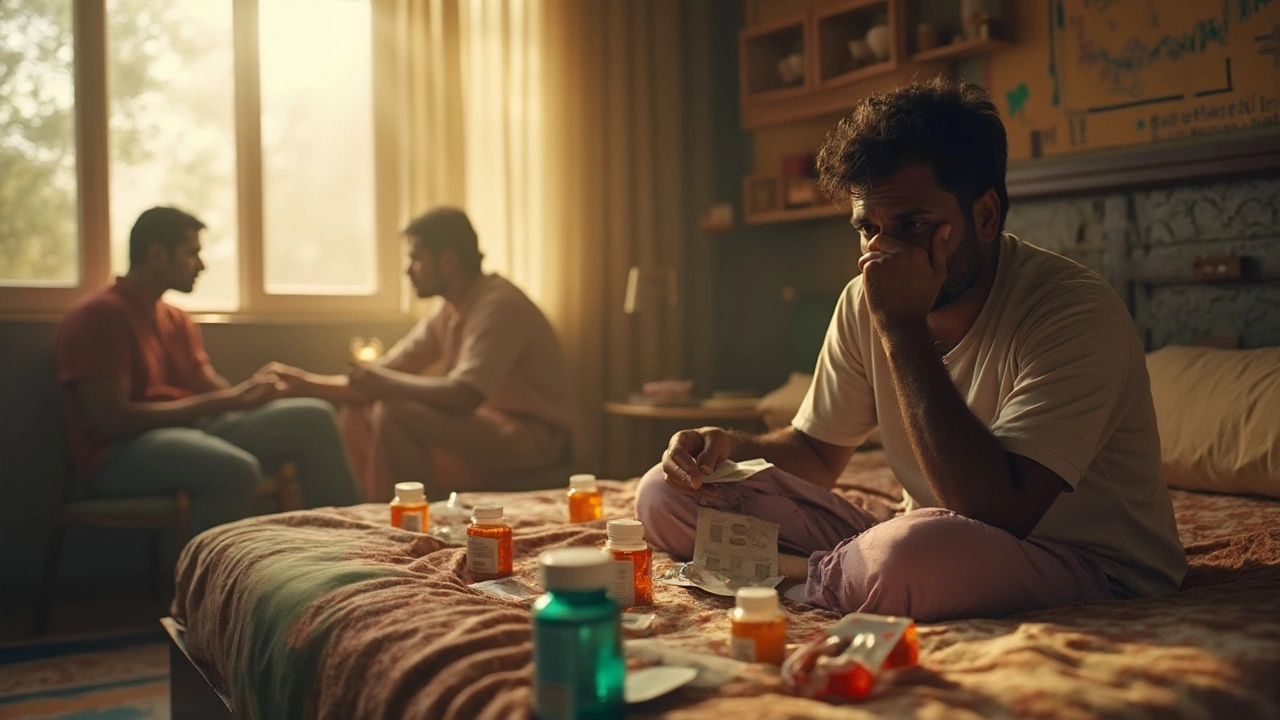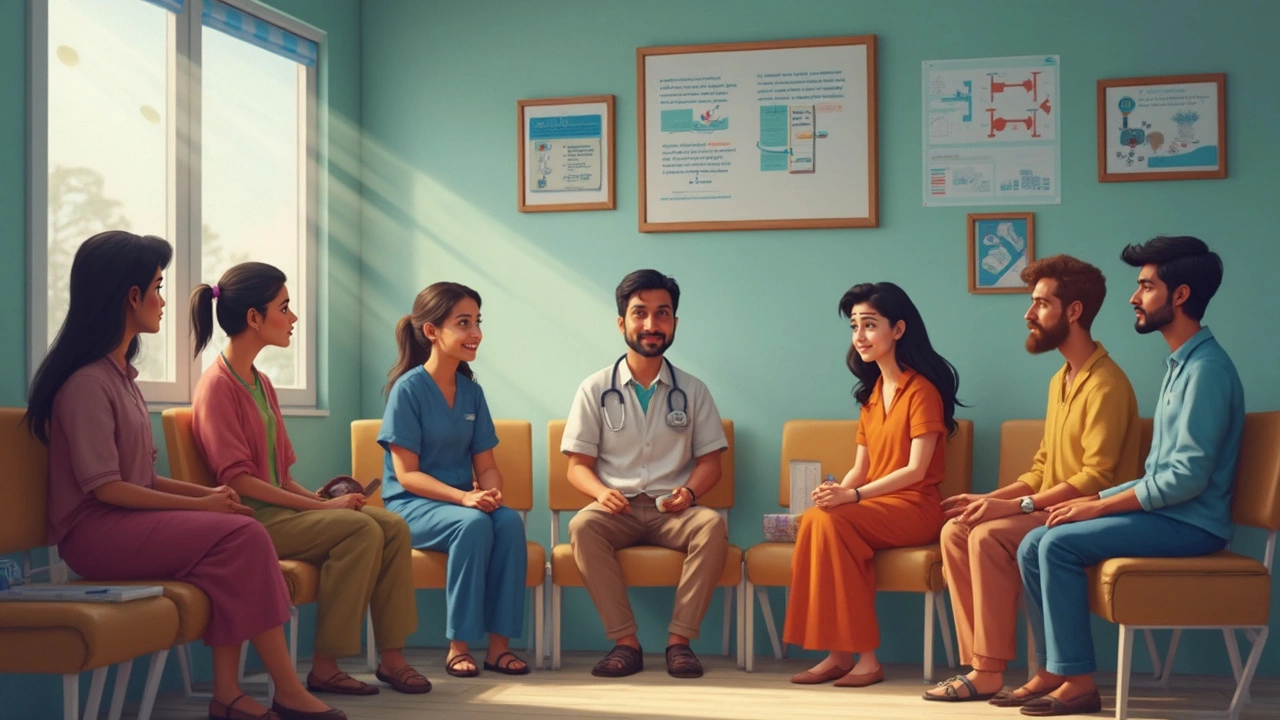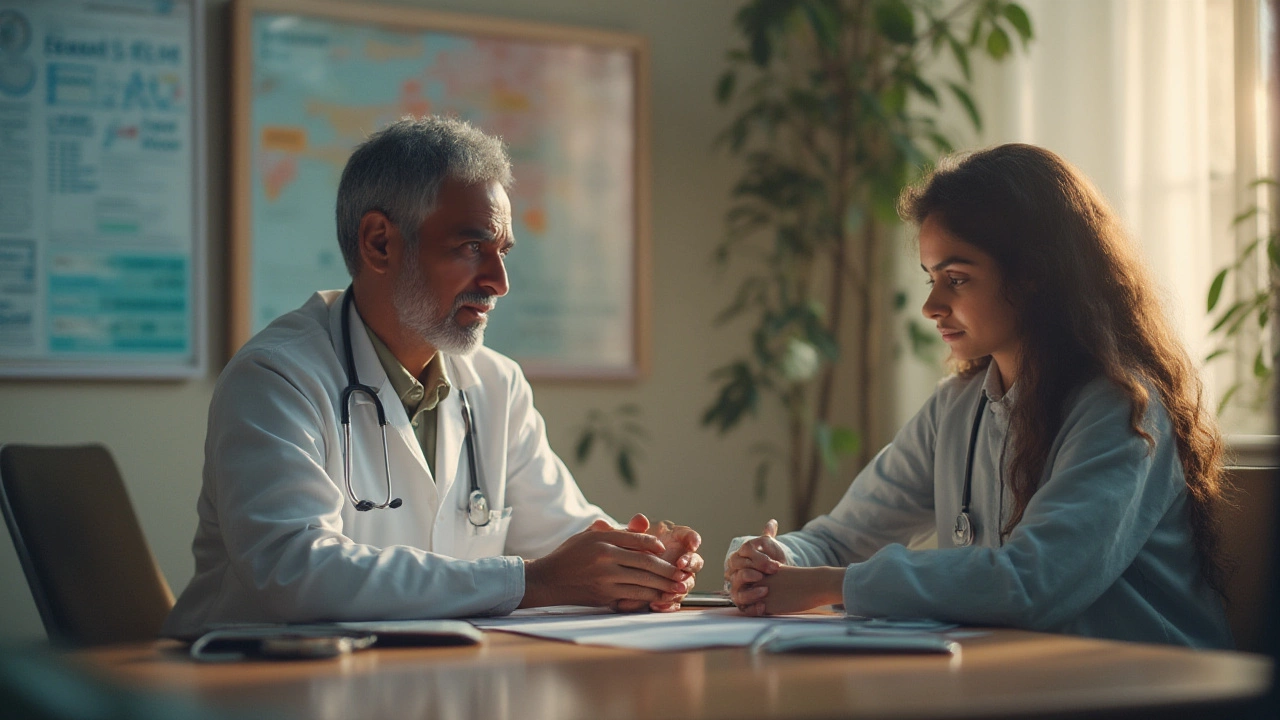
Gabapentin has been in my medicine cabinet, and probably lots of others, for everything from nerve pain to anxiety. But no one tells you about the grogginess that can hit like a truck. That heavy, can’t-keep-your-eyes-open feeling is more common than you’d think. When I took gabapentin, I remember yawning through dinner, and one time, I nearly nodded off during my daughter's favorite cartoon. Not ideal, especially if you’ve got a long drive or a busy job.
So, why does gabapentin cause so much drowsiness? The drug calms down certain signals in your brain, which can help kill pain. But it also leaves you feeling totally wiped. People taking higher doses or who are new to the drug are most likely to notice this. Older adults, especially, should be extra careful—one study out of the UK showed seniors were three times more likely to fall after starting gabapentin than before.
- Why Is Gabapentin Prescribed So Much?
- Pinpointing the Most Common Side Effect
- How Drowsiness Impacts Daily Life
- Who’s Most at Risk and Why
- Tips to Stay Safe While Taking Gabapentin
Why Is Gabapentin Prescribed So Much?
If you’ve ever had annoying nerve pain or restless legs that just won’t stop twitching, there’s a good chance your doctor mentioned gabapentin. This med was first made for controlling certain seizures, but doctors quickly saw it helped with way more problems.
Today, gabapentin is prescribed not just for epilepsy, but also for nerve pain from shingles, diabetic neuropathy, restless legs syndrome, hot flashes in menopause, and even some types of chronic pain that don’t budge with normal painkillers. Doctors like it because it usually doesn’t come with the addiction risk that messes with a lot of pain meds.
Just how popular is it? In the US, gabapentin is one of the top 10 most prescribed drugs—over 70 million prescriptions in one recent year. That puts it right up there with old regulars like statins and blood pressure pills.
| Condition | Why Gabapentin? |
|---|---|
| Seizures (Epilepsy) | Helps lower the chance of seizures |
| Nerve Pain (Neuropathy) | Lessens shooting, burning, or tingling pain |
| Restless Legs Syndrome | Reduces urge and discomfort in legs |
| Hot Flashes (Menopause/Breast Cancer) | Decreases the number and strength of hot flashes |
| Chronic Pain | Helps those who can’t use strong painkillers |
Another reason gabapentin is everywhere: it doesn’t need tight controls like opioids or Xanax. So, when someone complains of stubborn pain, doctors often see it as a safer first step. This easy access means more folks are using it than ever, whether for big health issues or smaller day-to-day aches.
Pinpointing the Most Common Side Effect
Ask any pharmacist—when people talk about gabapentin, the first side effect that comes up is drowsiness. It’s not just tiredness after a long day—this is the kind where you can barely keep your eyelids open, even after a decent night’s sleep. Doctors and pharmacists actually call it “somnolence” in their notes, but in real life, it just means you might feel like taking a nap at your desk, during a movie, or while watching your kid’s soccer game.
This isn’t rare, either. If you look at the numbers, drowsiness shows up in about 19% to 28% of adults taking gabapentin, and it’s even higher if you’re taking big doses or starting the medicine for the first time. For older adults, the risk can climb up toward 40%. And here’s the thing: it often doesn’t go away in the first few days. Some folks struggle with it for weeks, making daily stuff—like driving, work, or even having a real conversation—way tougher than it should be.
| Side Effect | Adults (%) | Seniors (%) |
|---|---|---|
| Drowsiness | 19 - 28 | Up to 40 |
| Dizziness | 13 - 21 | 27 |
| Swelling | 8 | 11 |
People sometimes mistake this drowsiness for a flare-up of their original problem, so they up the dose or ignore it, which only makes things worse. It’s worth actually warning your friends or family if you’re starting gabapentin, especially teens or older loved ones. Staying alert takes some planning, and you’ll want to keep an eye on how the medicine is affecting day-to-day life, not just the pain you’re trying to treat.
If you notice that drowsiness is making you sloppy on the road or nodding off in class, talk to your doctor. You might need to adjust the dose or switch when you take it—like at bedtime instead of in the morning. And don’t mix it with other meds that make you sleepy unless you have doctor’s orders. Gabapentin’s sleepy side is real—and it’s easier to deal with if you know what to watch for.

How Drowsiness Impacts Daily Life
If you've ever tried gabapentin, you know the drowsiness isn't a passing annoyance—it can mess up your whole routine. Even taking your morning dose can make you want to crawl back into bed by 10 a.m. Some people on gabapentin say they feel as if their head is full of cotton for hours. That’s a problem if you work, drive, watch your kids, or do anything that needs your full attention.
Check out these real-world stats on drowsiness and how it interferes with regular life:
| Activity | Percentage of Gabapentin Users Reporting Drowsiness Issues |
|---|---|
| Working at the office | 32% |
| Driving | 19% |
| Taking care of children | 14% |
| Watching TV or reading | 51% |
Drowsiness isn’t just about wanting to nap; it slows down your reflexes and messes up your focus. Car accidents and falls at home climb higher for people starting on gabapentin, especially in the first few weeks. There was honestly a period where I double-checked every step on the stairs, since the sluggishness can sneak up out of nowhere.
Here are some common complaints people have shared about gabapentin and daily life:
- Nodding off at meetings or at your desk
- Feeling spaced out or forgetful
- Trouble staying awake during family activities
- Missing out on important moments with kids or friends
If you notice you're feeling sluggish, it’s not just you. Gabapentin makes plenty of people tired. Timing your dose right or talking to your doctor about adjusting the amount can help a lot. If you’re handling anything risky, like driving or climbing ladders, take it slow until you know how your body reacts.
Who’s Most at Risk and Why
The sleepy side effect from gabapentin really doesn’t hit everyone the same way. Some folks breeze through it, but others can barely keep their eyes open. Let’s break down who needs to be extra cautious.
First off, seniors are at the top of the risk list. As people get older, their bodies process medications differently. Their livers and kidneys slow down a bit, so gabapentin sticks around longer than it does in younger people. That builds up the drowsiness—and also makes them more likely to trip and fall. Docs in Australia even sound the alarm about this after seeing hospital admissions jump in people over 65 who started on gabapentin.
Another group that has to watch out? Anyone with kidney problems. Gabapentin is cleared by your kidneys, so if they’re not working great, the drug piles up. This makes side effects much stronger and last longer. Always tell your doctor if you’ve had any issues with your kidneys before starting the med.
Pile on top of that anyone taking other stuff that makes them sleepy—think sleeping pills, allergy meds, painkillers, or even strong cough syrup. Mixing these with gabapentin is like pouring gasoline on a fire of tiredness. It’s easy to underestimate this.
Just started on gabapentin? You’ll probably feel the most gabapentin effect in the first week. It gets a bit better as your body adjusts, but some people always feel wiped out after each dose.
- Older adults (over 65)
- People with kidney problems
- Anyone taking other sedating meds
- Folks who up their dose too quickly
Nurses in big hospital systems keep an eye out for sleepiness by checking how steady someone walks, if they’re having trouble remembering things, or if they just seem too tired to function. If you or someone you care for lands in these groups, talk to the doctor about a lower starting dose or extra help staying safe—like grab bars at home or setting alarms for meds and appointments.

Tips to Stay Safe While Taking Gabapentin
If you’re starting gabapentin, there are a few easy things you can do to dodge trouble—especially when it comes to that intense drowsiness. The golden rule? Always take gabapentin exactly as your doctor says. Never suddenly stop, as quitting cold turkey can cause withdrawal symptoms, like anxiety or even seizures.
Drowsiness might sound harmless, but if you’re driving, cooking, or caring for kids, it gets real fast. Try these steps to make things safer:
- Gabapentin usually makes people the sleepiest when they first start or after a dose change. If you can, take it at night for the first few days and see how your body reacts.
- Avoid mixing gabapentin with alcohol or other drugs that slow you down, like sleeping pills or certain allergy meds. That combo can knock you out harder than you expect.
- Set up a family plan—for example, don’t handle power tools or climb ladders until you know how you react to the medication. I don’t let my daughter’s hand go while on a new med, just in case I suddenly feel woozy.
- If you start to feel wobbly, dizzy, or super sleepy, sit down and call for help. Don’t try to push through or “walk it off.”
- Keep your doctor in the loop. If drowsiness or any side effect drags on, your dose might need adjusting.
Older adults or anyone with kidney problems need extra care, as gabapentin stays in the body longer for them. A pharmacist once told me,
“Starting low and going slow with the dose really cuts down on nasty surprises. We see far fewer side effects when people stick to gradual increases.”
Bring a list of all your meds to every checkup—gabapentin can interact with other drugs. And don’t forget, missed doses can mess up how your body handles withdrawal, so keep to a routine (set a reminder on your phone if you have to).
If anything feels off, trust your gut and ask a doctor right away. Safety is all about paying attention early, not waiting for a real problem to pop up.







